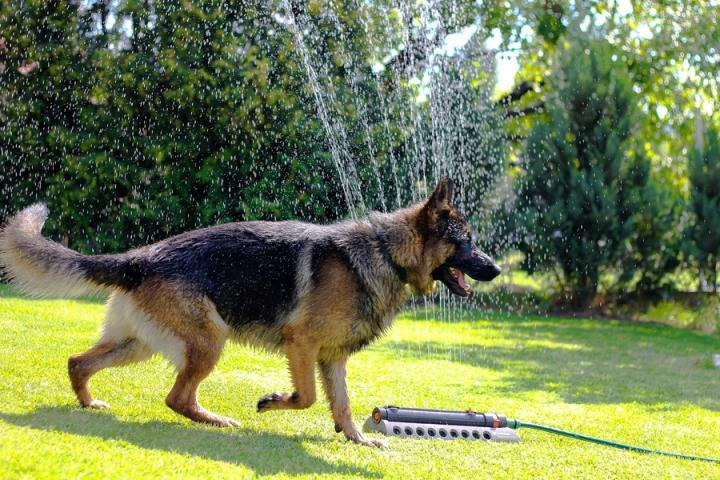Summertime pet advice from the Dick Vet
As temperatures rise, follow our top tips to make sure your pets don't overheat.
Summer is our hottest season when lots of people enjoy spending more time outdoors with family, friends and their pets. But as temperatures rise (yes, even in Scotland!), our pets have a higher risk of becoming easily overheated, being more susceptible to skin and ear infections, and having a heatstroke.
We have outlined some tips on how to beat the heat and keep your pet healthy and happy this summer. If you have any concerns then always speak to your local vet, who’ll be happy to help.

Provide plenty of water and shade
Pets can become dehydrated quickly, so make sure they have access to plenty of fresh, clean water on hot summer days at all times. Also make sure your pets have a shady place to get out of the sun, and use pet-safe sun cream on exposed parts of your dog’s skin, especially their ears and nose, when they are out in direct sunlight.
If it’s too hot to venture outside, then make sure your home has circulating cool air to stop your pet overheating. Providing damp towels, blankets or cool-mats for your dog to lie on is a great way to help keep them cool.
Know the signs of heatstroke in pets
Unlike humans, dogs can’t sweat through their skin and so they rely on panting and releasing heat through their paw pads and nose to regulate their body temperature and keep cool. If dogs are too hot and are unable to reduce their body temperature by panting, they can develop heatstroke – which is very serious and can kill.
Know the signs of heatstroke:
- Excessive panting
- Extreme salivation
- Appearing lethargic, drowsy, or uncoordinated
- Distress
- Collapse
If you suspect your pet is suffering from heatstroke, move them to a cool place, wet their coat with cool water, and contact your vet immediately.
Never leave your pet in the car
Pets left unattended in a car can quickly develop heatstroke on a warm summer day. Never leave your animal alone in a parked vehicle even for a short period of time with the windows open.
If you see a dog in distress inside a car, official advice is to dial 999 immediately and ask for the police. A dog in distress in a hot car is an emergency and the police will advise you what to do based on the situation.
Mind your walking hours
On hot days, walk your dog during the cooler parts of the day, in the early morning and late evening. Dog’s paw pads can burn on hot pavements. As a general rule, if it’s too hot for your hand it’s too hot for their paws.
Swimming advice
Swimming is an excellent exercise for your pet and a great way to keep them cool in the summer. However, there are some tips to be mindful of:
- Not all dogs like to swim, so never force or throw them into water.
- Be wary of tides at the beach, they can be dangerous.
- Bring fresh water with you to the beach and try to avoid your dog drinking saltwater. It’s likely to make them feel sick.
- If your dog swims or paddles in the sea to keep cool, remember to rinse the saltwater and sand from their coat afterwards to avoid drying out and irritating their skin.
- Make sure rivers, ponds, and canals are clean before letting your dog dive in. Some types of algae, including blue-green algae, are toxic to dogs. If your dog swims in algae-contaminated water, contact your vet immediately.
Be mindful of these tips in the heat and enjoy the summertime with your pet!
About the Royal (Dick) School of Veterinary Studies
The Royal (Dick) School of Veterinary Studies is a one-of-a-kind centre of excellence in clinical activity, teaching and research. Our purpose-built campus, set against the backdrop of the beautiful Pentland Hills Regional Park, is home to more than eight hundred staff and almost fourteen hundred students, all of whom contribute to our exceptional community ethos.
The School comprises:
The Global Academy of Agriculture and Food Systems
The Hospital for Small Animals
The Jeanne Marchig International Centre for Animal Welfare Education
We represent the largest concentration of animal science-related expertise in Europe, impacting local, regional, national and international communities in terms of economic growth, the provision of clinical services and the advancement of scientific knowledge.

